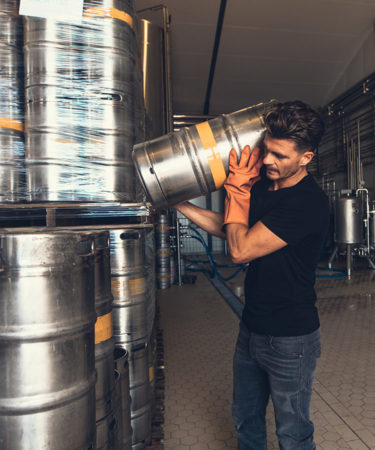The Brewers Association (BA) published its annual Industry Review in the New Brewer this month. Among its takeaways is that 24 of the top 50 craft brewing companies didn’t grow last year. They didn’t grow the year before, either.
Boston Beer, Sierra Nevada, Deschutes, Rogue, and Green Flash are among the beer companies that saw their numbers flatline — or drop. (It’s been a tough year for Green Flash. Solidarity, folks.)
The luckier half of the top 50 saw double-digit growth. Congratulations to Rhinegeist, Wachusett, Dogfish Head, Three Floyds, and the like.
But for brewers hoping to keep their businesses afloat, 50-50 odds are not great.
When half of the most successful craft brands are seeing steady declines, this tells us one thing: They’re just not selling enough beer to continue apace with their prior production levels. In the face of increased competition from large and small breweries alike, this is no surprise.
It’s all part of growing up. I see these types of brewers as the parents of craft beer. We love and respect them tremendously, but we don’t necessarily need them anymore. At least not as much as we used to. We still look to them for advice and comfort and acknowledge the importance of their presence in the world — without them our tastes and better-than-ever selection would not exist — but their role has changed.
Brands like Sierra Nevada, Samuel Adams, and Rogue are still in the game, but maybe it’s time for them to acknowledge their changing role in the craft beer family. They have the know-how and wisdom to lead successful businesses. They’ve done it already.
Maybe it’s time they use those decades of wisdom and mid-tier resources to look beyond national borders. American craft beer is an increasingly competitive market. Now seems like a great time to look to exports.
Shaun Hill’s Statements About Alcoholism and Mental Illness in the Beer Industry Are Upsetting, Especially to Shaun Hill
Last week, the Morning Advertiser published an interview with Hill Farmstead founder Shaun Hill discussing the link between mental health and alcohol.
I for one was surprised but impressed that Hill took this interview. Not everyone felt this way, though, including Hill himself.
After the article went to print, Hill lamented its existence in the form of a statement posted in a Beer Advocate forum about the article. Hill says his “heart sank” when he saw the article, feeling that the conversation, and his comments, were taken out of context.
This is upsetting for so many reasons. For one, it’s a bummer that Hill feels misrepresented. Nobody wants to see something published about them that they feel portrays them in a negative light. (Although, again, I don’t think the article did this. But I’m not the one being held up as a poster child for a cause.)
Another disappointing development came from (where else) the comments section. One forum participant calls Hill “kind of a miserable dude,” while others come to Hill’s defense by spewing about “fake news” and “clickbait,” portraying the journalist as some kind of muckraking fraud.
Hill’s interview is not fake news. It was a real interview, and he said what he said on the record. Period.
Whether it’s clickbait is debatable, but click the headline (the original was actually “Beer industry ‘failing to address’ mental health and alcohol link”), and what you get is a thought-provoking, moving interview with one of the beer industry’s most prominent figures.
I sympathize with Hill wholeheartedly. I really do. But I’m also disappointed to see him back away from this. The beer industry needs to balance pleasures and pressures. This comes easy to some but can be extremely difficult for most. Acknowledging alcoholism and mental health issues is essential to the longevity of our industry, on an individual level and as a whole.
CBD Beers Nipped in the Bud
After a continuous stream of cannabis-infused beers trickled into the market, the Alcohol and Tobacco Tax and Trade Bureau (TTB) has officially vetoed alcoholic beverages containing controlled substances. Hemp beers are still fair game, but anything with marijuana, tetrahydrocannabinols (THC), cannabidiols (CBD), or part of a cannabis plant that’s in the Controlled Substances Act (CSA) definition of marijuana — whether or not those substances are legal in the state — are a no-go. Womp womp.
It’s a totally lame move on the TTB’s part. CBD is not harmful or intoxicating, and these hybrid beers showed signs of a possible new market marrying hop and hemp. Long Trail, which we recently learned saw the steepest decrease in craft beer production last year, will now have to pluck another product, its CBD-infused Medicator, off the canning and tap lines. Black Hammer Brewing will nix its eight beers containing CBD. And it’s safe to say this marks an end to CBD Beer Fest.
But where there’s a will, there’s a way. If craft brewers know how to do one thing, it’s to challenge and upend their limitations. This may be a buzzkill for now, but we’re confident brewers will find new ways to incorporate cannabis in their taprooms. Keep on keepin’ on, friends.
